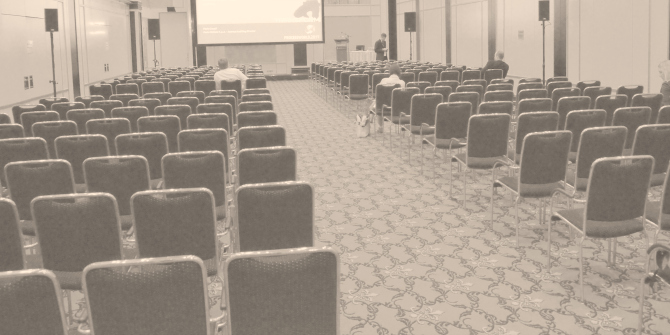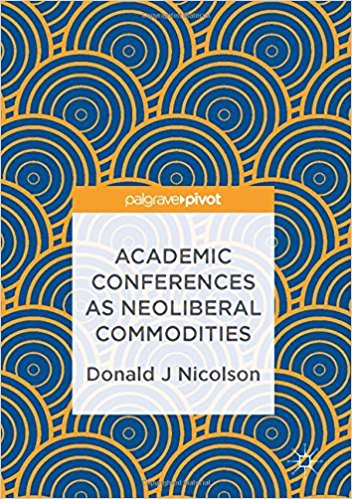What role do academic conferences play in the construction of an academic career? In Academic Conferences as Neoliberal Commodities, Donald J. Nicolson examines the link between the value attributed to participation in academic conferences and the broader neoliberalisation of the academy. Fawzia Haeri Mazanderani welcomes this short book for beginning a meaningful conversation about the significance of this aspect of academic life.
Academic Conferences as Neoliberal Commodities. Donald J. Nicolson. Palgrave Pivot. 2017.
While rarely interrogated for the role that they play, academic conferences form a significant part in the construction of an academic career. Any aspiring, or indeed expiring, academic has at some point presented at, or attended, a conference. How many researchers have sat sleepily in a stuffy room, listening to the chap who ate all the egg-and-cress sandwiches at lunch drone on about something that they suspect might be interesting and important, but which they can’t quite pay attention to because they are too distracted with thoughts of their own impending presentation? How many researchers have made obligatory nods to a slideshow that could have been in a different language for all they understood, and then bit their lip in silence when someone asked a ten-minute question that was not really a question but instead sounded suspiciously like self-aggrandisement?
If such ponderings resonate with you, then you have probably found yourself like Donald J. Nicolson, speculating on the value and purpose of attending an academic conference. Nicolson’s book Academic Conferences as Neoliberal Commodities provides an exploratory study into conferences in the social sciences, looking explicitly at the link between conferences and the neoliberalism of academia itself. In this strikingly original work, the author draws upon an assortment of methods, including an analysis of five conference case studies, notes made at conferences he personally attended, conference records, abstract booklets and interviews with people from a range of backgrounds. The novel layout of the book starts each chapter as though a conference presentation, with an abstract and keywords. Opening with a ‘Welcome’, the reader moves through several ‘parallel’ sessions before the ‘Closing Keynote’. Nicolson, a freelance writer with a background in academic research, writes independently of any university or funding body and employs a lucid writing style that makes for an accessible and enjoyable read.
After reflecting upon the difficulties of defining ‘neoliberal’, he argues that, ultimately, the neoliberalisation of the university has resulted in changes whereby in place of the traditional professional culture of open intellectual enquiry and debate, there is now an institutional stress on measurable performance. By seeing knowledge as a product that can arise from a conference, Nicolson considers such events as having a role in the ‘knowledge enterprise’ industry that by promoting a method, data set or research cause as a commodity, becomes the product and marketplace itself. The academic culture of conferences themselves may vary: a point noted by Les Back when he characterises Australian ones as ‘vicious and boozy’, US conferences as ‘status conscious and networking-obsessed’ and British equivalents as ‘polite and consensual’. While recognising that reasons for attending conferences are also variable, the book nonetheless demonstrates how the overarching function of the conference lies in its premise of promoting intellectual communication.
 Image Credit: Conference Break (axisexpress CC BY 2.0)
Image Credit: Conference Break (axisexpress CC BY 2.0)
Acknowledging that academia plays out differently across contexts, the book alludes to what conferences of our increasingly neoliberal future may look like. Nicolson makes brief references to the rise of ‘5 minute presentations’ and ‘posters’, and relays the potential role of Twitter as well as variants on the academic conference, such as TED Talks. While his own study is not extensive, this raises the need for further exploration of the different directions in which academic conferences could be heading and the ways in which technology is changing the traditional structure of the conference.
Appreciating that ‘the Helsinki Conference would not have been the same had it been conducted as a group email’ (17), the author also considers the constraints of conference attendance where travel plays a pertinent role. He raises concerns about the environmental impact of carbon emissions from airplanes and money wasted on conferences. While academics from universities in the northern hemisphere may enjoy generous travel budgets and mobility, this is generally not the case for researchers coming from the Global South. Nicolson reflects upon how last year, at the biannual conference of the African Studies Association of the United Kingdom, an unconfirmed number of delegates were unable to attend due to visa refusals. Where a conference is hosted inevitably influences who can attend, and as such has implications for knowledge sharing and development: a pressing concern in a world of increasing walls. Nicolson importantly points out that while conferences are often labelled ‘international’ and ‘global’, the reality is that they often have a homogenising effect given that the intellectual environment within which they are held largely celebrates Anglo-American, English-speaking academic culture.
The book notes that a key reason for people to go to conferences is to engage with colleagues in their field and establish networks. As such, conferences can help prevent the isolation often associated with academia. In reality, however, conferences can themselves be potentially alienating, and such socialising may not come naturally to everyone. This is particularly the case given the ambiguous nature of ‘professional socialisation’, whereby one partakes in the awkward juggling act of grasping at something intelligent to say, while at the same time not too intelligent, lest you come across as if you aren’t a well-rounded person who has no interests beyond the article that is currently keeping you up at night. This socialisation may be traditionally performed over the conference dinner, a seemingly cordial opportunity for delegates to make new acquaintances or catch up with colleagues. Some of Nicolson’s respondents reflected upon how the ‘real work’ at a conference happens at the bar (53). While this point is not merely about enjoying an alcoholic beverage but rather the significance of face-to-face interaction, it again reflects the Eurocentric manner by which professional socialisation often takes place within academia. This is a point that Nicolson unfortunately does not reflect upon, but which might have bearing for scholars who do not drink alcohol for personal reasons or due to religious practices. Another limitation of the book, which the author duly acknowledges, is that the research reported does not provide a representative sample of conferences or interviewees.
Nonetheless, while narrow in its scope, Academic Conferences as Neoliberal Commodities represents the start of a meaningful conversation, and is highly recommended to anyone working within the social sciences who aspires to make the most out of this unexplored yet integral part of performing and producing academia. The lingering impression for me is that while calls for abstracts at conferences often express ambitious aims and desires to transform the face of a field, there is little evidence that conferences in themselves have led to ground-breaking change. Yet, as noted by Nicolson, the very notion of conferences having a measurable impact is in itself a reflection of neoliberal thinking whereby everything has a cost and a value. The examples in the book highlight how the impact of a conference need not be that it is paradigm-defining, but can be experienced at a personal level. This might just be through the strategic rationale of fluffing out one’s CV or through the way in which, if the conference is a good one, it could make the attendee feel excited and enthused about research, triggering new ideas. While demonstrating that the individual gain of conferences fits with neoliberal ideology, there is room to explore how conferences could serve as spaces for collaboration, and indeed, for resistance of the same structures that perpetuate their existence.
Fawzia Haeri Mazanderani is in the third year of her PhD in Education at the University of Sussex. Her dissertation focuses on the development of aspirations of young people living in post-apartheid South Africa. She has a background in Social Anthropology from UCT (South Africa) and SOAS (London).
Note: This review gives the views of the author, and not the position of the LSE Review of Books blog, or of the London School of Economics.


 Find this book:
Find this book: 





I never did a conference in Australia, so cannot corroborate the exact point above; but having drank with Australian’s at a conference, I suspect it is true… 😉